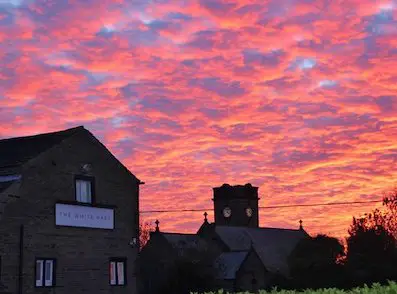This is the first part of the weather-lore rhyme:
Red sky at night; shepherds delight,
Red sky in the morning; shepherds warning
Sometimes the phrase involves sailors rather than shepherds – both have a more than usual interest in the weather.
This is the first part of the weather-lore rhyme:
Red sky at night; shepherds delight,
Red sky in the morning; shepherds warning
Sometimes the phrase involves sailors rather than shepherds – both have a more than usual interest in the weather.
The saying is very old and quite likely to have been passed on by word of mouth for some time before it was ever written down. There is a written version in Matthew XVI in the Wyclif Bible, from as early as 1395:
“The eeuenynge maad, ye seien, It shal be cleer, for the heuene is lijk to reed; and the morwe, To day tempest, for heuen shyneth heuy, or sorwful.”
The Authorised Version gives that in a more familiar form:
“When it is evening, ye say, It will be fair weather: for the sky is red. And in the morning, It will be foul weather to day: for the sky is red and louring.”
There are many later citations of the saying in literature, including this from Shakespeare, in Venus & Adonis, 1593:
“Like a red morn, that ever yet betoken’d wreck to the seaman – sorrow to shepherds.”
So, that’s where it originated but why?
There are many proverbs and stories concerning the weather from medieval England; for example, the notion that the weather on St. Swithin’s Day (15th July) predicts the weather in England for the next 40 days:
St Swithin’s Day, if it does rain
Full forty days, it will remain
St Swithin’s Day, if it be fair
For forty days, t’will rain no more
This prediction is nonsense and the weather on that day has no more significance than any other.
When rhymes like that were established England had a primarily rural and maritime economy and weather was consequently of life and death importance. There was no accurate means of forecasting the weather, so the tendency to make the most of what little information they had to go on, and occasionally to put two and two together and make five, is hardly surprising.
The ‘red sky at night’ rhyme is more than an old wives’ tale though and has some meteorological foundation – in England at least.
To explain why we’ll need to know why clouds sometimes appear red and how that may be used to predict the weather. Firstly, why do clouds often appear red in the morning and evening?
– Sunlight is broken into the familiar rainbow spectrum of varying-wavelength colours as it passes through the atmosphere.
– The blue/violet end of the spectrum is diverted more than the red/orange.
(This is the same mechanism that causes us to see the sky as blue incidentally, but that’s getting rather off our point)
– When the sun is low in the sky, at dawn and dusk, sunlight travels through more atmosphere than at other times of day. The red wavelength is better able to go on a direct course and be reflected back off clouds, whereas the blue light is more scattered before reaching the cloud and is therefore less visible. So, we see the clouds as red as the light that is reaching them is primarily red.
…and how does that help predict the weather?
– The weather in the UK comes from the west, that is, the wind is primarily westerly.
– The sun rises in the east and sets in the west.
– If there is broken cloud in the morning we may look to the west and see red light reflecting back from the cloud, that is, ‘red sky in the morning’. As the clouds are coming towards us there must be a chance of rain, at least an increased chance compared with the cloudless period we had just enjoyed.
– Likewise for ‘red sky at night’. If we see red clouds in the evening they will be in the east and have already passed us by, giving a good chance of clear skies and fine weather ahead.
See other ‘red’ phrases:
Red-handed (caught)
See also: the List of Proverbs.
Trend of red sky at night in printed material over time

A B C D E F G H I J K L M N O P Q R S T UV W XYZ
American Animals Australian Bible Body Colour Conflict Death Devil Dogs Emotions Euphemism Family Fashion Food French Horses ‘Jack’ Luck Money Military Music Names Nature Nautical Numbers Politics Religion Shakespeare Stupidity Entertainment Weather Women Work
Have you spotted something that needs updated on this page? We review all feedback we receive to ensure that we provide the most accurate and up to date information on phrases.